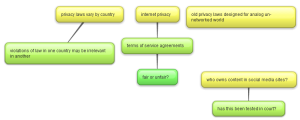Please note that the new due date for the research paper outline is Friday, November 11 by 10 am as an email attachment to me. Send either .doc, .docx, or .rtf formats, please!
On Wednesday, we’ll be discussing evaluation of sources in any format: how to evaluate. We’ll play the evaluation game with some of the criteria we came up with today in class.
You have two short reading assignments and a research blog post for Wednesday. Please read through the following two websites: Evaluating Web Pages: Techniques to Apply & Questions to Ask from UC Berkeley, and Critically Analyzing Information Sources from Cornell University.
Please write one research journal blog post addressing this prompt:
You’ve now written your research proposal and annotated bibliography – the next major step will be to write the first draft of your research paper. What strategies will you use when writing your first draft? What’s worked well for you when you’ve written other research papers? Do you feel uncertain or have any questions about writing the research paper?
Slides for today are available here.
Any questions about the upcoming research paper and related assignments? Feel free to ask by email or bring your questions to class.
~Prof. Leonard




